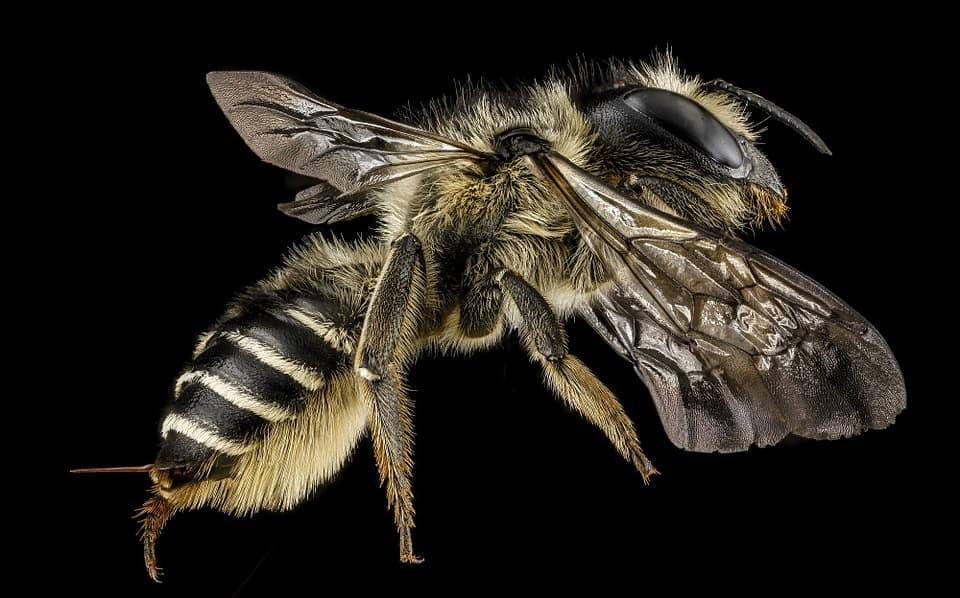Have you ever been stung by a bee?
Are bee stings something that has held you back in your beekeeping ventures? Have you ever wondered “What does a bee sting feel like?” – but having absolutely no intention of finding out?
If so, you aren’t alone. I have found in communicating with others about beekeeping that the fear of being stung is one of the largest hurdles people have to overcome.
So I want to help you with that. If you are considering keeping bees, I want to give you a greater understanding of what happens during a bee sting and why bees sting.
If you are currently a beekeeper, I want to give you some tips on how to properly cope with a bee sting.
Let’s get started.
What Is A Bee Sting And Why Do They Sting In The First Place?
A bee sting occurs when a bee inserts its barbed stinger into the skin. It releases a venom called apitoxin.
Apitoxin is very interesting as it is made up of multiple proteins that have many different effects on people. The main ingredient is mellitin. It is a peptide that is now being used to treat diseases such as HIV and cancer.
The release of the venom into your skin usually causes swelling to the area that was stung; slight pain can accompany the sting temporarily; and itching.
However, during the process of a sting the bee’s stinger will actually be ripped from its abdomen. This only occurs when it stings a human because our flesh is so tough. Sadly, the bee will lose its life once it has stung you.
After the bee has stung, its stinger will continue to wiggle and pump venom into the human victim until the stinger eventually quits moving or is removed.
There are some common misconceptions when talking about bees and being stung.
The first is bees do not sting because they are vicious. They will usually only sting for the following 3 reasons:
- The bee has been stepped on.
- The bee has been handled roughly.
- You are near the hive, and they think you are a threat.
The second misconception is that all bees sting.
Drones (or male bees) actually do not have stingers at all. Only the female worker bees do. Their stinger is the barbed stinger I mentioned earlier.
Queen bees have stingers as well but only use them (in most instances) to fight off rival queens. Their stingers are smoother compared to the female worker bees.
Having a better understanding of what happens when a bee stings or what causes one to sting in the first place is an important step in knowing how to avoid or treat a bee sting.
What Does All Of This Mean For You?
I threw a lot of factual information at you in the beginning because it is important to understand how bees function.
Now that you have the facts, it is time to put them together to see what this all means for you.
Basically, should you be freaked out if a bee stings you?
In a short answer, no. But you should pay close attention.
If you have never been stung by a bee before, I recommend going to your doctor and finding out if you are allergic.
Why? Because it is better to know ahead of time and be prepared. If you are allergic to bees there are ways around dealing with the allergy, like having an Epi-Pen on hand.
Only about 2% of people actually suffer from Anaphylactic Shock. This is a big word that means your whole body swells up like a balloon to the point where you can’t breathe because of bee venom.
If this happens you’ll need an Epi-Pen immediately and to seek medical attention at once. Does this happen to most people? No, but you never know if you are part of that 2% so just be safe.
For the rest of us, all of these facts mean try your best not to tick a bee off. Treat them with respect, and you shouldn’t have a problem.
There is another – thankfully extremely rare – event for which the bee sting would be a major problem for any of us. This is a situation where many bees sting an individual at once. Even then, the average human body responds remarkably effectively to even hundreds of stings. It is estimated that an adult can withstand over 1,000 bee stings before it risks being fatal. While that is an incredibly painful event, the fact that the body can withstand the simultaneous sting from so many bees is quite remarkable. Of course, this estimate is considerably lower for children and in the order of about 500 bee stings. Those with heart conditions will also be able to tolerate less.
But let’s keep this in context. Such an attack by a bee swarm is incredibly rare. Bees sting because they are threatened. The calm, gentle movements of a beekeeper doesn’t come close to stimulating that sort of all-out attack.
Here are a few pointers to avoid being stung in the first place:
- Don’t work in your bees during bad weather. Bees don’t like wind, rain, or cold so do them and yourself a favor and don’t work in them if the sun isn’t out. Think about it. Would you be happy if someone opened all of your windows, doors, and forced you out of your comfortable home on a day with bad weather? Probably not so don’t expect a much different reaction from them.
- Work in them when a lot of the bees are gone. During 10am and 2pm most of the bees are out foraging so that is a great time for you to go through them. Less bees at home equals less of a chance of you getting stung.
- Wear white and avoid dark colors. Bees sting dark colors, and they stay away from white. That one is pretty simple. Don’t wear pastel colors either. I’ve learned this the hard way as my bees have chased me through my garden thinking I was a flower. Not a fun experience!
- Never swat a bee and try not to run from them. Bees can fly up to 18mph. You aren’t going to outrun them. I know, it is a normal reaction. Hence, what I just said about my bees chasing me out of my own garden. But try not to run from them if you can help it. And certainly don’t swat at one. The worker bees are female, and they can sting. If you are female, think about yourself when someone invades your turf. Then imagine yourself in ‘Mama Bear Mode’ with a stinger to boot. I don’t know about you, but most would head for the hills if they saw me coming in that mood with a stinger too. This is what a female worker bee is like. Need I say more?
- Avoid smelling good around your bees. Bees will think you are a flower. So don’t practice good hygiene when going to see them. They’ll like you a little too much.
How To Cope If You Do Get Stung
Bee stings happen but not very often if you practice caution. I’ll be honest, we’ve kept bees for a few years now, and I got stung for the first time last week.
We had split some of our hives and had a few nucs that were raising queens. They are super defensive during that process. I walked too close to their hive, and a worker bee was on me.
So here is what you do in those instances:
- Get the stinger out. The stinger will continually pump venom into you as long as it moves. The more venom the more of an irritant it is to your body. So get it out as soon as you can.
- Wash the area with soap and water. Just like with any bite or wound, it is important to wash the area to avoid any infection.
- Put ointment on the sting. Any kind of anti-itch ointment you have will do the trick. You just don’t want to scratch the area.
- If swollen, place ice on it. Ice will reduce the swelling. So if you begin to swell in the area where you were stung just throw some ice on it.
- Take a Benadryl. Benadryl will help reduce itching and swelling because it is an antihistamine. At the first sign of either, take a few of those and rest.
Coping with bee stings is something you need to be aware of if keeping bees, but it shouldn’t be your main focus.
Enjoy your bees and deal with the stings as they come.

